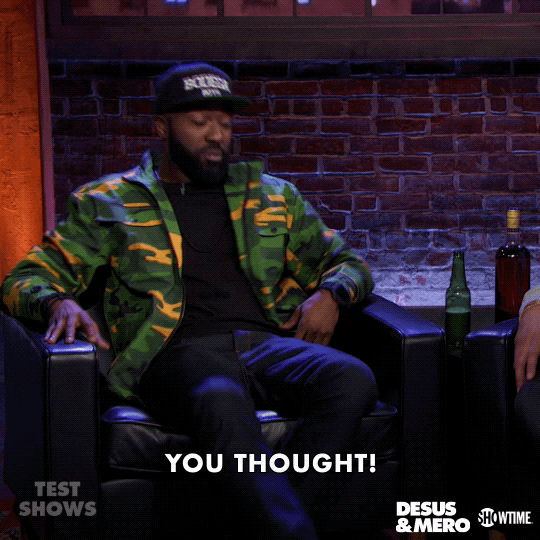Streaming NFL Games, Inflation, & Privacy Crypto takes Another Hit
This weekend I was reminded how silly the structure of TV distribution still is. Should I bite the bullet and pay to stream NFL games? Not with these inflation numbers.
I spent more than a decade working for various broadcast network affiliates in three different departments; production, marketing, and sales. I’ve seen how the sausage is made and sold. Point is, I have a pretty strong handle on the broadcast television business. A couple years ago I wrote about my problem with CBS All-Access. That post pre-dates Heretic Speculator on Substack so I’d wager 10 to 1 none of you have read it. The point of the post was that it’s silly for consumers to be able to watch a local market CBS NFL game for free with an antenna but not with CBS’ network-owned streaming app (now called Paramount+). You can watch CBS NFL games on Paramount+ so long as you pay the monthly fee to get that access.
You can read the whole post if you’re interested (it’s worth it just for the CBS/Boomer jokes), but this explains the issue fairly well:
We know if you sign up for the service, your IP address gives away your location and your live streaming option through All Access is the re-transmitted broadcast of your local CBS affiliate. Again, the local CBS affiliate is already providing this programming at no nominal cost to the consumer. It’s subsidized by advertising, of course, but there is no retransmission or carriage fee associated with over the air viewing. And I suspect that retrans is what is likely preventing CBS from providing NFL games to non-registered All Access users.
“Retrans” is short for retransmission fees. These fees are almost certainly the biggest reason why the user can’t stream something for free through CBS’ streaming app even though that same user can watch a local CBS affiliate for free with an antenna. This is particularly annoying during football season. Two NFL seasons have come and gone since I wrote that post, some things have changed but most of what I described above is still the same.
Changed: CBS All-Access has changed its name to Paramount+.
Unchanged: I can still get all of CBS’ live programming with a $15 antenna through my local affiliate in my 1st floor living room. Down a flight of stairs in the basement? No dice. I’d still have to pay to watch that same CBS NFL game in my basement because the antenna can’t pick up the signal and Paramount+ doesn’t offer local content for free.
To be fair, it isn’t just CBS’ Paramount+ app that paywalls NFL games that can be viewed for free with an antenna. The FOX Sports app requires a cable provider login to stream local games; rendering the app’s existence pointless since the content can just be viewed with the cable provider app and/or Set Top Box instead. Going that route additionally offer the plethora of non-FOX Sports content that comes with a standard Pay-TV subscription; so there is no point in using the FOX app. NBC’s Sunday Night Football can be viewed free with an antenna in my living room but requires a subscription to stream through NBC’s Peacock app. This is dumb since the apps collect my IP address and know my location.
So what’s the problem?
Retransmission fees. Whenever a cable or satellite operator provides local channels, that operator is paying the local channel’s parent owner a chunk of the monthly subscription fee. For example, if you pay YouTube TV $65 per month to stream live TV, YouTube TV is probably paying the owner of your local CBS affiliate a couple bucks from that $65. They do this for essentially every channel they provide whether the station is a local network affiliate or a cable-native station like CNN. The prices of each channel vary and they depend on things like audience levels and/or the parent company that owns the channel. For the locals, these parent companies are usually one of 5 or 6 larger station groups that include Nexstar (NXST), Gray (GTN), Sinclair (SBGI), PoopCorp (TGNA), and Scripps (SSP)
The station groups that own these channels almost always get in disputes with the Pay-TV providers when it’s time to renew agreements. And it isn’t just the companies that own local stations that face blackout risks. Disney and YouTube TV couldn’t agree to terms back in December and all of the Disney-owned channels were pulled as a result; including ESPN and several ABC stations in large markets. The problem that most consumers aren’t generally privy to is the level of middleman layers that come between them and the content creators they’re trying to watch. Since the rise of cable, the content distribution flow has generally looked like this:
The MVPDs are the cable operators. The local station groups are the companies that own the local news affiliates. And the major networks are CBS, NBC, ABC, and FOX. Those networks do the production deals with the NFL and other sports leagues. The networks then sell the games (along with their primetime and syndicated programs) to the local stations through affiliate agreements. The local stations then allow the cable providers to sell the content to you for a piece of the monthly cable bill. If you cut the cord, you can bypass the cable operator and get it all for free with an antenna. This is good for consumers, but bad for local station groups that have become increasingly reliant on the “stable” subscription revenue from their carriage deals. It’s also bad for the sports leagues ultimately since your money funnels to them through this distribution chain. But that’s a story for a different day.
Here’s what is interesting about this whole relationship though, CBS and NBC are essentially both the major network and the MVPD with their streaming apps. An example; CBS sells affiliation deals to station group companies like Nexstar. Nexstar then sells the content back to CBS so that the Paramount+ app can stream the local channel signals. It is a wildly silly structure made more clear now because none of these companies have been properly positioned for an environment where the internet disrupts traditional video consumption. I think it’s fairly obvious how this plays out. And I’ve placed a pretty large wager on how I see it going. You can get that idea here (and no it isn’t ROKU):
It would be wonderful if all of these companies could work together to allow local viewers to stream for free in the same way that they can use an antenna for local stations. I detailed why I won’t pay in my original CBS All Access post:
I’m not paying for a station that is free. In addition to the boomer-bonanza content library, paying for CBS All Access grants subscribers the live stream of the local CBS affiliate broadcast. Local news, programming, and yes, the NFL games. My question is, why do I have to pay for this downstairs if it’s free upstairs with a different piece of equipment? It makes no sense as a consumer.
I like watching NFL football games during fall and winter Sundays. I don’t like it enough to pay Paramount Global (PARA) $10 to get my local station’s stream. And guess what. I don’t have to. This should scare every executive working in local TV:
I can get the NFL games without the local broadcast for $5. Peacock offers SNF streaming as well. Since live sports is what is holding together the entire Pay-TV industry, these are clear examples of the networks taking steps toward cutting out the local station groups and traditional MVPDs entirely. Tick tock…
It’s Hotter Than a Stolen Tamale
The weather? No. Inflation! We knew inflation wasn’t transitory from the jump but by September of last year even Credit Master Jerome was saying things that were highly contradictory pertaining to the transitory narrative.
“The inflation is caused by bottlenecks. The bottlenecks will last longer. Inflation won’t though.” - Jerome, paraphrased
Look, I’ll admit it. I actually didn’t think inflation would be as hot is it came in today. But it did come in hot (again). And every risk market has taken a massive dive in response. As I write this the Nasdaq is down 4%, Gold is down almost 2%, Bitcoin is down 6%.
Why? The market is now expecting a 75 basis point rate hike and even entertaining 100 bps. This is a drastic change from yesterday when 50 bps actually had a possibility:
All I can say is we’ll see. The balance sheet tightening the Fed guided to begin in June has flat out not happened.
Certainly this all means the Fed can realistically allow T-bill roll off with foreign central banks losing interest and higher refinancing rates. Oh wait…
Privacy Coin Renegades
Yesterday Huobi Global announced it would be delisting 7 “privacy” coins from the platform.
Huobi Global strictly complies with the compliance policies of every country and region and always endeavors to safeguard our users' assets
Let’s put aside the thought that one company can possibly comply with the policies of every country and region, if Huobi wants to lapdog for the surveillance state, that’s Huobi’s choice. I woudn’’t do business with that company anymore, but that’s just me. The coins that are getting removed are the following:
Zcash (ZEC)
Dash (DASH)
Decred (DCR)
Firo (FIRO)
Horizen (ZEN)
Monero (XMR)
Verge (XVG)
Anyone who has been reading this stack for a few months likely knows my affinity for Zcash. It’s one of my biggest crypto bets at my #3 holding by weight after BTC and ETH. I think ZEC has a strong case as an enterprise solution if/when crypto is widely adopted in payment processing. While other coins like Monero are interesting and default to privacy, there are instances where transparent fund tracking is actually desirable; for verifying things like donations or debt settlement.
Naturally I have thoughts on this. It’s not good news and there’s no way to spin it as such. But it does prove that these coins are going to be seen as problematic according to the surveillance state. So if you want to have the ability to transact in a truly peer to peer way without everyone on the planet knowing what you’re doing, privacy coins are important. If, like me, you have Zcash or any other privacy-focused crypto, it is imperative that you pull it from the exchange where you purchased it and self-custody. Don’t think of these things as “investments.” While I do believe ZEC will ultimately outperform BTC 5 years from now from a capital investment perspective, the real way to treat these privacy coins is as cash.
They’re only valuable if you can actually use them. The network infrastructure is already there. The coins do you no good sitting on an exchange. If you have ZEC or any other privacy crypto, you should consider withdrawing those funds to a self-custodial wallet that has z-address functionality. Some recommendations:
Zecwallet is obviously Zcash-only. Edge and Unstoppable are highly robust wallets that offer integrations with dozens of other coins. I’ve tried them all. They’re very solid.
Continued Reading
Standard Disclaimer: I'm not an investment advisor. I just share what I do and why. Please do your own research. I’m long ZEC.










Privacy crypto will survive in any case, I see no reason for panic now. Now web3, blockchain and decentralization is developing a lot, and having that will let you stay untouchable. That's how utopia P2P project works and it's Crypton no kyc exchange https://crp.is/ So privacy coins will remain available in any case.
I used to have the NFL ticket but quit when it all went woke😖